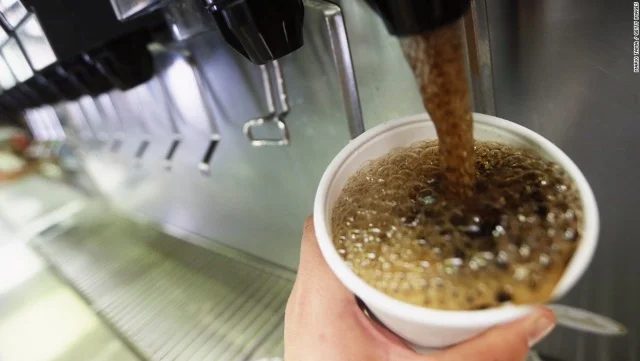Something of a scandal happened in Florida surrounding the state’s recent proposed constitutional amendment. Amendment 1 contained language that would have made it easier for Floridians to have solar panels installed on their homes. However, it also contained language that would have given utility companies the right to charge fees, specifically to solar panel owners. The utility backed amendment drew a lot of criticism and kick-started a vote no campaign when audio from a conservative think tank calling the amendment “political jiu-jitsu” was released. The amendment did not pass, but this event, and others like it, suggests that states should be wary before implementing strong legislation on this complex matter.
Kicking the Soda Habit
For many Americans, drinking soda is probably not the first thing to come to mind when thinking about unhealthy habits. However, Americans who drink sugary sodas daily gain more weight than those who do not. Rising consumption of sugary drinks has been a major contributor to the obesity epidemic. Also, people who consume sugary drinks regularly—one to two cans a day or more—have a twenty-six percent greater risk of developing type 2 diabetes than people who rarely have such drinks. Eliminating soda from the workplace is the first step in combating diabetes, obesity, and addiction to caffeine. Several universities and businesses across the country are fighting hard to combat this “sweet” addiction.
Kentucky Amish Not Dropping the Fight
Recently, Amish residents in Auburn, Kentucky received attention for fighting back against an ordinance requiring large animals to wear collection bags to catch their droppings. The language of the ordinance requires that “a properly fitted collection device shall be securely in place on all horses or other large animals while such animals are on the street within the city limits.” Anyone found guilty of violating the ordinance is only guilty of a violation (rather than a misdemeanor or a felony) and is subject to a $50 fine for each offense. Many have refused to comply based on concerns that the bags may frighten their horses, which has led to an accumulation of cases being brought on the issue.
Cautious Optimism: The Future of Renewable Energy under a Trump Administration
On November 8, 2016, Donald J. Trump was elected the forty-fifth President of the United States. Shortly thereafter, corporations within the renewable energy sector experienced a substantial market reaction. The stock price of the nation’s largest solar panel manufacturer, First Solar, plunged 6.5 percent, and investors in Vestas Wind Systems, a global leader in wind energy, realized a loss of approximately ten percent. SunPower, the Silicon Valley based front-runner in solar innovation, watched as the value of its shares plummeted nearly eighteen percent. In the days that followed the presidential election, industry-wide stock prices partially recovered; however, the shares of many renewable energy corporations continue to trade beneath pre-election figures.
Chemical Water Contamination Leads to Lawsuits But No Solution
Recently, citizens of three townships in Pennsylvania discovered that toxic chemicals had contaminated both their public and private water supplies. Two residents, J. Davy and Josephine Yockey, are suing six major companies that used hazardous chemicals and compounds in their products, which allegedly lead to the water’s contamination. The plaintiffs are suing individually but have also instituted a class action on behalf of all similarly situated residents. The plaintiffs and members of the class action claim they have been exposed for years to these chemicals at unsafe levels, and since discovery of the contamination in the summer of 2016, they have been forced to buy bottled water for drinking and cooking. Defendants include The 3M Company, The Ansul Company, National Foam, Chemguard, Buckeye Fire Protection, and Angus Fire.
The End Doesn't Justify the Means: Why the EPA's Clean Power Plan is Unconstitutional
Coal has been a bedrock component of our national economy and energy policy for decades. Not so long ago, John F. Kennedy said, “It would be the height of folly for this nation to permit its coal mines to be abandoned… and to neglect further research and development in this major American industry.” Even under the current administration, U.S. policy has supported investing in clean coal technologies. As recently as 2010, the Environmental Protection Agency (hereinafter “EPA”) acknowledged that “[c]lean coal is an important part of our energy future,” and listed advanced coal technologies among its key environmental initiatives.
Thoroughbred Owners vs. Claiming Race Regulations: The Fight Continues to the United States Supreme Court
Dinosaur Tax: Illinois Subsidizes Diesel at the Expense of Cleaner Fuels
Recently, an Illinois tax tribunal ruled that compressed natural gas (CNG) is taxable under the state’s eighty-seven year old Motor Fuel Tax Law (MFTL). The tribunal decided that CNG was taxable under the statute because it was left intentionally ambiguous as to what fuel was taxable by prefacing a non-exhaustive list with ‘among other things. By ignoring the distinction between traditional fuels and alternative fuels, the tax tribunal could extend the MFTL to any fuel usable by a vehicle. This tax is extended to CNG without any mention of that fuel in the statute.
Wade in the Water
In March 31, 2016, a lawsuit was filed against an exorbitant list of defendants, but the most notable on that list were Governor Rick Snyder, the Michigan Department of Environmental Quality, and the State of Michigan. A handful of plaintiffs brought this action alleging a violation of the Safe Drinking Water Act. This lawsuit is apropos of the Flint Water Crisis.














